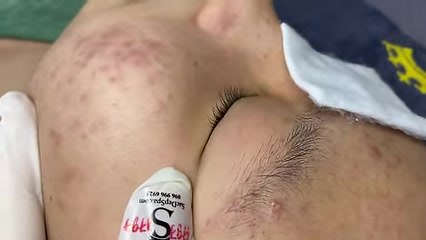Click Button Play To Watch Full Video 👇👇
What Your Acne Means by Location According to a Dermatologist
Acne is a common skin condition that can manifest in various ways, often reflecting underlying health issues or lifestyle choices. Dermatologists frequently note that the location of acne breakouts can provide valuable insights into the causes behind them. Understanding these patterns can help individuals take targeted actions to improve their skin health.
Forehead: Stress and Digestive Health
Breakouts on the forehead are often associated with stress and digestive issues. This area is linked to the gastrointestinal system, so acne here may indicate that your body is struggling with digestion, possibly due to a diet high in processed foods or sugars. Stress can exacerbate hormonal imbalances, leading to increased oil production and clogged pores. Dermatologists often recommend dietary adjustments, such as incorporating more fruits, vegetables, and whole grains, along with stress-relief techniques like mindfulness, meditation, or regular exercise to help manage these breakouts.
T-Zone: Hormonal Fluctuations
The T-zone, which includes the forehead, nose, and chin, is particularly oily due to the concentration of sebaceous glands. Breakouts in this area are frequently linked to hormonal fluctuations, especially during puberty, menstruation, or due to conditions like polycystic ovary syndrome (PCOS). A dermatologist may recommend hormonal treatments, such as oral contraceptives or anti-androgens, to help stabilize hormone levels. Additionally, a consistent skincare routine that includes gentle exfoliation and oil-free products can be effective in managing T-zone acne, preventing clogged pores and excessive oiliness.
Cheeks: Allergies and Environmental Factors
Acne on the cheeks can indicate environmental irritants or allergies. This area is particularly susceptible to factors like pollution, dust, and allergens, which can clog pores and cause inflammation. Dermatologists often advise patients to evaluate their skincare and makeup products for potential irritants and to use non-comedogenic options that won’t clog pores. Practicing good hygiene—such as frequently washing pillowcases and cleaning mobile devices—can also help reduce cheek acne. Incorporating gentle, hydrating products can soothe irritated skin and improve overall texture.
Chin and Jawline: Hormonal Imbalances
Breakouts along the chin and jawline are frequently associated with hormonal imbalances, particularly in women. These types of acne can fluctuate with menstrual cycles, pregnancy, or conditions like PCOS. Dermatologists often recommend hormonal treatments, such as birth control pills or anti-androgens, to help regulate hormone levels. Topical treatments containing salicylic acid or benzoyl peroxide can also be effective in targeting inflammation and preventing clogged pores in this area.
Back and Shoulders: Lifestyle Choices
Body acne, especially on the back and shoulders, is commonly linked to lifestyle factors. Tight clothing, excessive sweating, and inadequate hygiene can trap oil and bacteria, leading to breakouts. Dermatologists typically recommend using body washes with exfoliating ingredients and showering promptly after sweating or exercising. Opting for breathable fabrics can also help reduce body acne. Regular exfoliation is essential for maintaining clear skin and preventing blockages.
Neck: Stress and Hormonal Factors
Acne on the neck can reflect a combination of stress and hormonal fluctuations, similar to the chin and jawline. Breakouts in this area often indicate hormonal changes, and dermatologists may suggest stress management strategies and a skincare routine focused on gentle cleansing and exfoliation to keep this area clear.
Conclusion: Understanding Acne Patterns
Recognizing the relationship between acne location and underlying health issues can empower individuals to take control of their skin health. While these patterns provide helpful insights, consulting a dermatologist is essential for personalized care and effective treatment. By addressing both the visible symptoms and their root causes, individuals can work towards achieving clearer, healthier skin. Understanding your acne not only facilitates effective treatment but also enhances your overall confidence and quality of life.
